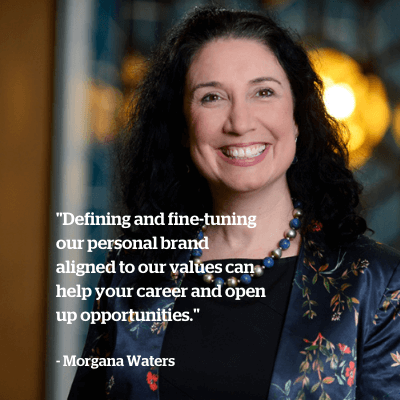Take control of your personal brand, before someone else does
- Your personal brand is a valuable asset that you need to create — or others will create for you
- It can provide confidence, build credibility and help you communicate what you stand for
- Every interaction you have is an opportunity to strengthen your personal brand or dilute it.
Think ‘brand’ and we usually think ‘business’. But each and every one of us has our own personal brand, whether we’re actively aware of it or not.
We carry our personal brand — our perception or impression based on our experience, expertise, beliefs, actions and achievements — with us everywhere we go.
And, in business, it can mean make or break.
“The definition of a personal brand can be summed up in one sentence: It’s what people say and feel when we’ve left the room,” says Morgana Waters, QBE Group Head — Leadership and Learning.
From the way we present ourselves to the outside world to the things we say and how we say them, our personal brand comprises a number of aspects, all of which we can influence.
“Owning our personal brand is key to taking an active role in the direction of our career and how we want to show up — especially around what matters to you and how you want others to feel as a result of your actions” says Waters. “Our personal brand helps us make the most of what we’ve got to offer, and enables us to convey what we stand for in our own authentic way.”
Defining and fine-tuning our personal brand aligned to our values can help your career and open up a whole host of new opportunities.
“It helps you create a long-lasting impression with a purpose,” says Waters. “It gives us permission to be ourselves, to gain confidence, to build credibility and, ultimately, make an impact.”
And if you don’t take responsibility for your personal brand, others will by default.
Your personal brand in a virtual world
Of course, in today’s environment, our online presence is often just as visible as our in-person presence — if not more so given the amount of interactions we undertake in the ‘digital’ world.
From tone of voice in Zoom discussions to what we post and comment about on social media, we create a huge amount of clues from which people piece together their view of our personal brand.
“You don’t have to be all things to all people in the real world, and you don’t need to be that digitally either,” says Waters.
“It’s important to start with what makes sense to you; be authentic, stay constructive and develop a pattern of consistency.”
If part of your personal brand is to be an authority on insurance, then commit to demonstrating that by consistently (not constantly) posting insights online and sharing those insights with your clients.
“Follow brands and people that relate to your areas of interest,” says Waters. “Actively post on LinkedIn but with a considered view of how it links to your brand and how you want people to feel as a result of what you are sharing.”
Taking control of your personal brand
To truly own your personal brand, you need to be very clear about who you really are, and what you want to accomplish. Understand your strengths and skills and what you want to be known for in your business and within your networks. And analyse everything from how you greet clients and how you correspond over email to how you dress and your body language.
 “Ask yourself: is this how I want people to feel and am I comfortable about what people say about me now? And what would you like them to say or do as a result of your impact?,” says Waters.
“Ask yourself: is this how I want people to feel and am I comfortable about what people say about me now? And what would you like them to say or do as a result of your impact?,” says Waters.
“Then check that by asking five business contacts and five personal acquaintances to describe you in five words.”
Above all, your personal brand has to be natural and real — it’s got to be you.
“This isn’t about pretending to be someone you’re not,” says Waters. “However, your personal brand can be aspirational, as long as it feels comfortable and achievable.”
As well as knowing what your personal brand is, however, it’s important to know what it’s not.
“It’s not a marketing campaign or an opportunity for self-admiration or to brag about yourself,” says Waters. “It’s about creating what you want other people to consistently see and feel as a result of how you show up.”
Making your personal brand a reality
Once you’ve got an idea of your personal brand, it’s time to live and breathe it in your day-to-day life.
For example, if your goal is to be well-known or become an expert in your field, seek out conference-speaking opportunities and begin using social media consistently to demonstrate your knowledge.
“It’s important to consider your day-to-day activities and how you deliver your personal brand consistently,” says Waters.
“It should come naturally as hopefully you’re simply being conscious of delivering your strongest skills and attributes consistently, but it’s important to be very mindful of how you may be misinterpreted or understood.”
Because, remember, everything you do will either strengthen it or dilute it.
While building a brand is a personal choice, it is a long-term asset that will continue to grow with every single positive interaction you have.
Access past webinars and watch our session on personal brand with Sydney Swans CEO Tom Harley.
